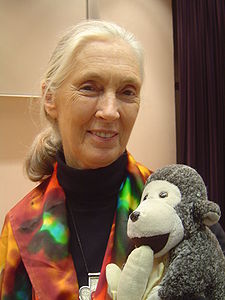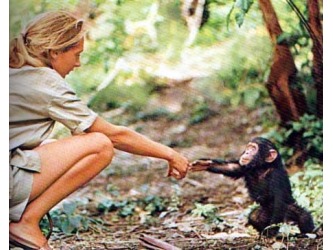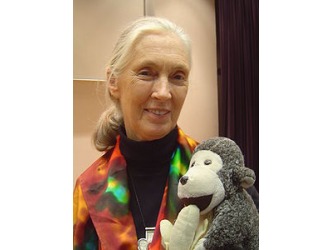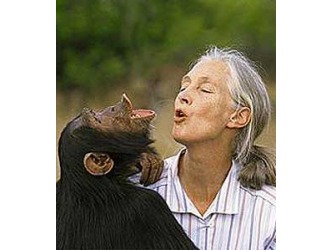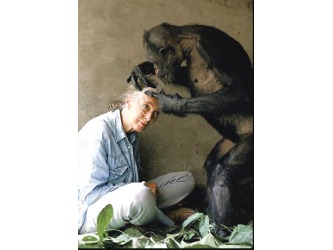JANE GOODALL
Dame Jane Goodall, DBE (born Valerie Jane Morris Goodall on 3 April 1934) is an English UN Messenger of Peace, primatologist, ethologist, and anthropologist. She is well-known for her 45-year study of chimpanzee social and family interactions in Gombe Stream National Park, Tanzania, and for founding the Jane Goodall Institute.
Early life and studies Jane Goodall was born in London, England in 1934. As a child she was given a lifelike chimpanzee toy named Jubilee by her father. Goodall was not very interested in animals until her father brought her the stuffed animal. Today, the toy still sits on her dresser in London. After the divorce of her parents when Goodall was 12 years old, she moved with her mother to Bournemouth, England.
Goodall's interest in animals prompted notable anthropologist Louis Leakey to hire her as his assistant and secretary. He invited her to accompany him and his wife, Mary Leakey, to dig at Olduvai Gorge in easern Africa. He asked Goodall to study the chimpanzees of Gombe Stream National Park (then known as 'Gombe Stream Chimpanzee Reserve'). She arrived at Gombe accompanied by her mother in July 1960. Leakey arranged for her to return to the United Kingdom where she earned a doctorate in ethology from Darwin College, the University of Cambridge in 1964. Along with Dian Fossey, famous for living with gorillas, and Biruté Galdikas, who advanced studies in orangutans, Goodall was one of three women dubbed "Leakey's Angels".
Personal life Goodall has been married twice. On 28 March 1964 she married aristocratic wildlife photographer Baron Hugo van Lawick at Chelsea Old Church, London, becoming Baroness Jane van Lawick-Goodall. The couple had a son, Hugo Eric Louis, affectionately known as 'Grub', who was born in 1967. They divorced in 1974. In 1975 she married Derek Bryceson (a member of Tanzania's parliament and the director of that country's national parks) and they remained married until his death in 1980. Jane and her younger sister, Judy, both suffer from prosopagnosia, a neurological condition which impairs the recognition of human faces.
Professional accomplishments Orphaned by poachers, young chimpanzees are raised by volunteers and researchers at the Tchimpounga Sanctuary (part of the Jane Goodall Institute) in the Republic of the Congo. Goodall is best known for her study of chimpanzee social and family life. She began studying the Kaselka chimpanzee community in Gombe Stream National Park, Tanzania in 1960 In 1977, Goodall established the Jane Goodall Institute (JGI), which supports the Gombe research, and she is a global leader in the effort to protect chimpanzees and their habitats. With nineteen offices around the world, the JGI is widely recognized for innovative, community-centered conservation and development programs in Africa and a global youth program, Roots & Shoots, which currently has over 8,000 groups in over 100 countries. Today, Goodall devotes virtually all of her time to advocacy on behalf of chimpanzees and the environment, traveling nearly 300 days a year. Goodall is also a board member for the world's largest chimpanzee sanctuary outside of Africa, Save the Chimps in Fort Pierce, Florida.
Goodall was instrumental in the study of social learning, primate cognition, thinking and culture in wild chimpanzees, their differentiation from the bonobo, and the inclusion of both chimpanzee species, and the gorilla, as Hominids.
One of Goodall's major break-throughs in the field of primatology was the discovery of tool-making among chimpanzees during her study. Though many animals had been clearly observed using 'tools', previously, only humans were thought to make tools, and tool-making was considered the defining difference between humans and other animals. This discovery convinced several scientists to reconsider their definition of being human.
